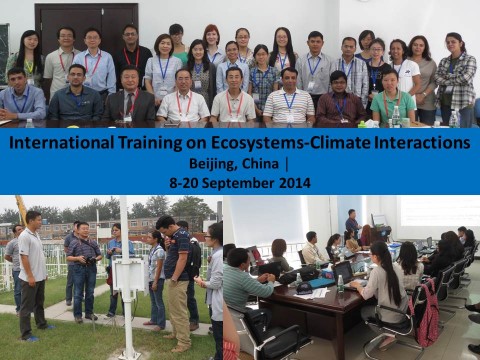OML Center participates at the International Training on Ecosystems-Climate Interaction

Climate-related Risks and Disasters in the 3rd National Climate Conference
December 9, 2016
OML Center Participates in Focus Group Discussion on the Private Sector Participation in CCAM
December 9, 2016By: Rafaela Jane Delfino
OML Center Researcher, Ms. Rafaela Jane Delfino, participated at the 2014 International Training on Ecosystem-Climate Interactions from September 8 to 20, 2014 held at the Institute of Atmospheric Physics (IAP), Chinese Academy of Sciences (CAS), Beijing, China. The training aimed to build the capacity of young researches to enable them to actively contribute to the process of climate change adaptation and ecosystem management in their respective countries and Asia-Pacific region. Ms. Delfino, along with 14 other participants from Asian Countries and 7 local participants, attended interactive learning sessions for two weeks to enhance understanding of the scientific principles and methods behind the climate-ecosystem interaction.
According to Dr. Jia Gensuo, IAP-CAS Professor and Training Head, “the training hoped to provide young researchers and practitioners from Asia-Pacific countries with advanced knowledge and skills in this fast-moving field, and to enhance the environmental capacity building for the region’s sustainable development.” The participants are mostly young scholars working on climate change sciences with special focus on ecosystem and climate change observation, analysis, and modeling with corresponding professional background in atmospheric sciences, ecology, or earth sciences at M.S. or higher level.
Ten (10) experts from Australia, USA and China served as the resource speakers. One well-published and multi-awarded Chinese professor now based in the U.S. said: “We haven’t succeeded in answering all questions. The answers we have found only serve to raise a whole set of new questions. In some ways, we feel we are as confused as ever, but we believe we are confused on a higher level and about more important things.”
The training sessions comprised of lectures and seminars along with site visits and excursions to state-of-the-art facilities and field stations. The discussion revolved around multi-platform observation, trends and impact analysis, and ecosystem and climate modeling. More specifically, the lectures touched on basic ecological responses and feedbacks to the changes in climate and vice versa; regional ecosystem-climate interactions at different scales (from plot to watershed to national to regional); current tools and methodologies to understand the complexities of this interactions (from manual/field, laboratory, experimental to advanced technologies such as remote sensing); and their potential implications to policy and programs.
At the end of the training program, the participants shared research results, key issues, research gaps and policy priorities of their respective countries on ecosystems and climate. Ms. Delfino presented the results from the Center’s initiatives such as the Climate Change Projection Project with PAGASA highlighting results from the recently published article on “Long-term trends and extremes in observed daily precipitation and near surface air temperature in the Philippines for the period 1951–2010” and Climate Knowledge Portal for the Philippines, Philippine Climate Change Assessment with the Climate Change Commission, Workshop on Translating Climate and Disaster Information for Effective Decision-making, among other relevant outputs.
Professor Jia further reported that the organizers received 233 applications from 21 Asian countries from which only 23 (16 from Asian countries and 7 local participants) were selected.
The training helped advance the author’s appreciation to the growing need for climate change adaptation backed up by sound scientific and climate information by providing a deeper understanding of the interactions between climate and ecosystems and the changes that comes with and brought about by these interactions. The knowledge gained from this training will be a useful tool towards the author’s professional growth, and more importantly, contribute to achieving the goal of the Center – that is science for climate resilient communities.
The training course was sponsored by the Asia Pacific Network for Global Change Research or APN (www.apn-gcr.org), and organized by START Regional Center for East Asia (TEA).

